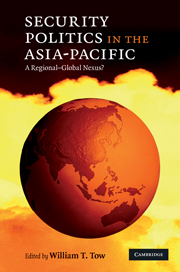Book contents
- Frontmatter
- Contents
- List of illustrations
- About the contributors
- Preface
- Acknowledgements
- List of abbreviations
- 1 Setting the context
- Part I
- Part II
- Part III
- 11 Problematising ‘linkages’ between Southeast Asian and international terrorism
- 12 Nuclear weapons: Asian case studies and global ramifications
- 13 Maritime security: regional concerns and global implications
- 14 Thinking globally and acting regionally: securitising energy and environment
- 15 Regional health and global security: the Asian cradle of pandemic influenza
- Part IV
- References
- Index
13 - Maritime security: regional concerns and global implications
Published online by Cambridge University Press: 05 June 2012
- Frontmatter
- Contents
- List of illustrations
- About the contributors
- Preface
- Acknowledgements
- List of abbreviations
- 1 Setting the context
- Part I
- Part II
- Part III
- 11 Problematising ‘linkages’ between Southeast Asian and international terrorism
- 12 Nuclear weapons: Asian case studies and global ramifications
- 13 Maritime security: regional concerns and global implications
- 14 Thinking globally and acting regionally: securitising energy and environment
- 15 Regional health and global security: the Asian cradle of pandemic influenza
- Part IV
- References
- Index
Summary
Introduction
Maritime security in the Asia-Pacific attracts much attention at present, although many of the concerns are not new. A close relationship exists between regional maritime security and energy security. Increased regional interest in assured access to sources of energy partly explains the greater interest in maritime security. Conflicting claims to sovereignty over offshore islands and competition for offshore resources are a source of tension in Northeast Asia. In Southeast Asia, there are also disputed sovereignty claims. The security of shipping against the threats of piracy and maritime terrorism is of major interest, especially for the Northeast Asian countries, which depend so heavily on the security of the sea lines of communication (SLOCs) from the Middle East through the Indian Ocean to the Malacca and Singapore straits to the South and East China seas, for sustaining their access to energy supplies. Meanwhile, Asia-Pacific naval budgets continue to grow with consequent risks to regional security and the possibility of a ‘naval arms race’. This is particularly true in Southeast Asia (Kaneda 2006). Problems loom on the horizon, including increased competition for maritime hegemony between the major regional sea powers – China, Japan and India.
There is a large imbalance between regional oil consumption and production. The Asia-Pacific currently contributes 9.8 per cent of global oil production but consumes 28.9 per cent of total oil production (Wesley 2007: 33). The major regional sea powers are also the main regional oil consumers.
- Type
- Chapter
- Information
- Security Politics in the Asia-PacificA Regional-Global Nexus?, pp. 247 - 265Publisher: Cambridge University PressPrint publication year: 2009
- 1
- Cited by



